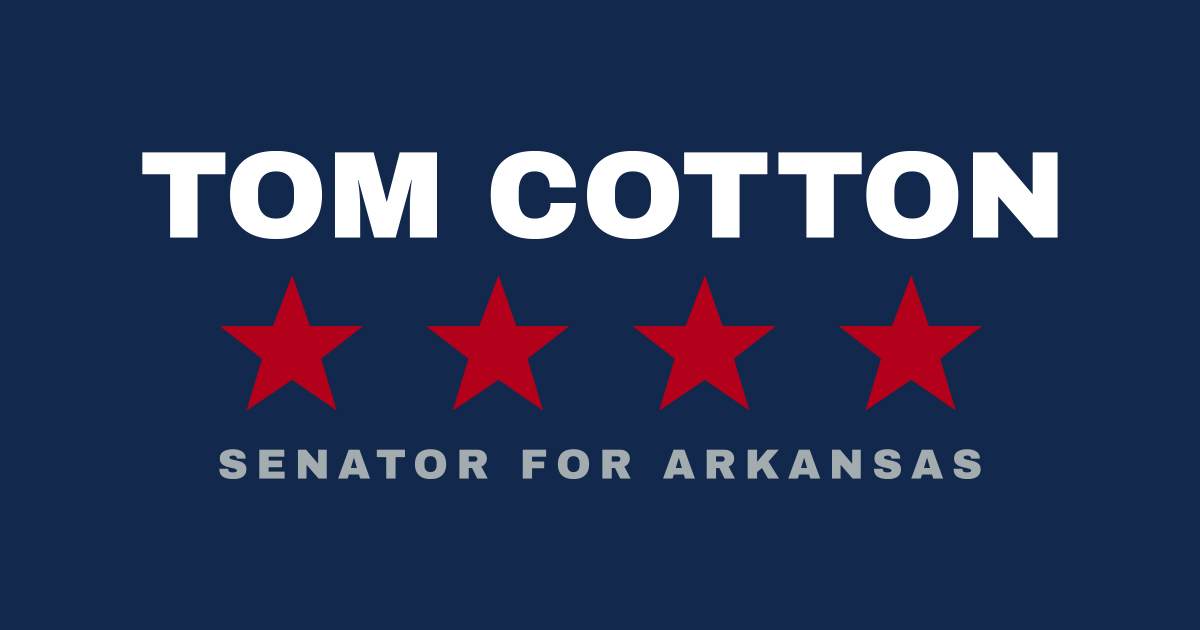Source: United States Senator for Arkansas Tom Cotton
FOR IMMEDIATE RELEASE
Contact: James Arnold or Mary Collins Atkinson (202) 224-2353
April 7, 2022
Cotton Demands Answers About Exclusion of Chinese-Made Products from Section 301 Tariffs
Washington, D.C. — Senator Tom Cotton (R-Arkansas) today sent a letter to U.S. Trade Representative Katherine Tai demanding answers about the USTR’s decision to exclude over 350 Chinese-made products from Section 301 tariffs.
In part, Cotton wrote, “This decision is yet another example of the disconnect between your tough talk and your agency’s weak actions. You have spoken compellingly on the need for firm action against China. Just last week, you testified before the House Ways and Means Committee that China violated its Phase I trade deal obligations and that the communists in Beijing ‘only comply with those trade obligations that fit its own interests.’ I agree. China lives by the simple motto of ‘lie, cheat, and steal’ and has wiped out millions of American manufacturing jobs and tens of thousands of factories as a result. I also agreed with your statement that ‘enforcement is a key component of our worker-centered trade policy.’”
“Unfortunately, USTR’s recent actions contradict your strong rhetoric. Days ago, your agency blew a massive hole in our enforcement regime by approving tariff exemptions for over 350 Chinese-made products. Earlier last month, USTR also punted on opening new 301 investigations into China’s economic abuses. These trade concessions are a gift to Chinese producers that continue your agency’s pattern of economic appeasement,” Cotton continued.
Text of the letter may be found here and below.
The Honorable Katherine Tai
U.S. Trade Representative
600 17th Street, NW
Washington, D.C. 20508
Dear Ambassador Tai,
I write to express my concern with USTR’s recent decision to exclude over 350 Chinese-made products from Section 301 tariffs. This decision is yet another example of the disconnect between your tough talk and your agency’s weak actions.
You have spoken compellingly on the need for firm action against China. Just last week, you testified before the House Ways and Means Committee that China violated its Phase I trade deal obligations and that the communists in Beijing “only comply with those trade obligations that fit its own interests.” I agree. China lives by the simple motto of “lie, cheat, and steal” and has wiped out millions of American manufacturing jobs and tens of thousands of factories as a result. I also agreed with your statement that “enforcement is a key component of our worker-centered trade policy.”
Unfortunately, USTR’s recent actions contradict your strong rhetoric. Days ago, your agency blew a massive hole in our enforcement regime by approving tariff exemptions for over 350 Chinese-made products. Earlier last month, USTR also punted on opening new 301 investigations into China’s economic abuses. These trade concessions are a gift to Chinese producers that continue your agency’s pattern of economic appeasement.
In your congressional testimony, you stated that a public “trust gap” has emerged on trade policy. Sadly, your agency’s tendency to say one thing and do another has contributed to this crisis of confidence. I urge you to change course and restore the American people’s trust in our nation’s trade policy. Please answer the following questions so that the American people can better understand USTR’s recent actions:
- How many of the over 350 Chinese items recently exempted from tariffs could be produced by the United States or a U.S. ally? Please share with members of Congress the research that was conducted to reach this conclusion.
- During internal deliberations, did career USTR staff believe these exemptions were justified on the merits or did political staff at the White House or any agency pressure USTR to approve them?
- In estimated total dollar value, how much will trade with China likely increase as a result of these tariff exemptions? Will our trade deficit likely grow or shrink?
- Did we receive any reciprocal tariff reductions or other trade concessions from China in response to these exemptions?
With regards,
###
